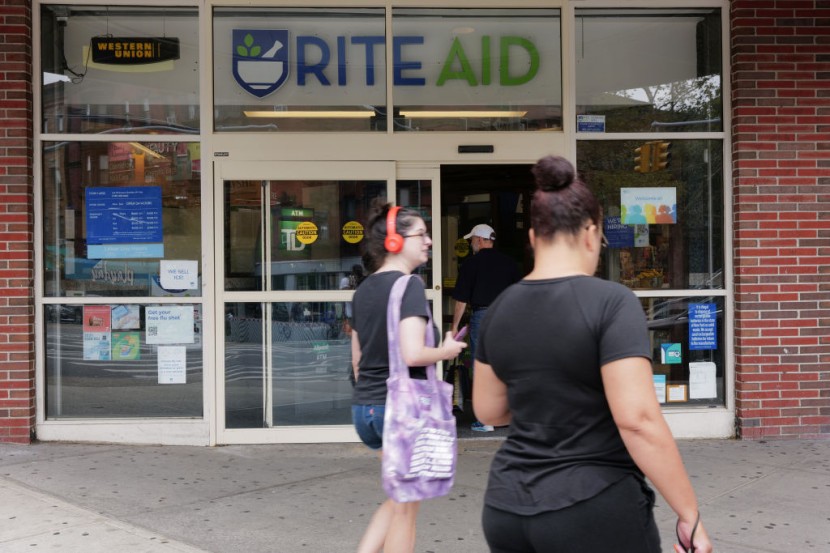
(Photo: by Spencer Platt/Getty Images) NEW YORK, NEW YORK - AUGUST 28: A Rite Aid store stands in Brooklyn on August 28, 2023, in New York City. Rite Aid, a national chain retail pharmacy and convenience store with thousands of locations across the country, is preparing to file for Chapter 11 bankruptcy as it faces increasing financial stress related to opioid lawsuits and other financial pressures.
Rite Aid, a major U.S. pharmacy chain, announced on Sunday that it had filed for bankruptcy and secured $3.45 billion in new funding as it implements a reorganization plan while struggling with declining sales and lawsuits relating to opioid use.
In 2022, Rite Aid reached a settlement with claims alleging that pharmacies contributed to an excess of prescription opioids for up to $30 million. It said that the bankruptcy filing was a step in a process to reduce its debt and position itself for future growth after it and its creditors came to an agreement on a financial restructuring plan, according to CBS News.
Reducing the Company's Debt
According to Rite Aid, the strategy will "significantly reduce the company's debt" and aid in "resolving litigation claims in an equitable manner."
The Justice Department filed a case against Rite Aid in March, saying that between May 2014 and June 2019, Rite Aid knowingly filled hundreds of thousands of illegal prescriptions for dangerous narcotics. Additionally, the corporation and pharmacists were charged with ignoring "red flags" that the prescriptions were unlawful.
Following a complaint from three Rite Aid pharmacy whistleblowers, the Justice Department took action.
As of Sunday, Elizabeth Burr, who served as temporary CEO and is still a member of Rite Aid's board, was replaced as CEO by Jeffrey Stein, the leader of a financial consultancy firm.
Rite Aid informed the New York Stock Exchange earlier this month that the company did not meet the requirements for listing. The company's stock is still listed and traded during a grace period.
The company's business activities and its U.S. operations would not be impacted by the bankruptcy filing in New Jersey and the violation of listing rules. Requirements for Securities and Exchange Commission reporting, it said.
Although some "underperforming" outlets among its more than 2,100 pharmacies in 17 states will be closed, Rite Aid said it was making arrangements for the payment of wages and other charges as usual.
It previously disclosed that its revenue decreased to $5.7 billion from $6.0 billion in the fiscal quarter that ended on June 3 of last year, resulting in a $306.7 million net loss.
Rite Aid, which employs over 45,000 people, has had difficulty competing with bigger rivals like CVS and Walgreens Boots Alliance as well as Amazon in recent years. The company's declining sales left it with less money to invest in its companies and made it more challenging to repay its debt. It has $3.3 billion in debt as of June, excluding the ongoing opioid case, per business records.
Read also: US Opioid Crisis: CVS Health Agrees To $5 Billion Settlement of Nationwide Lawsuits
A Deal With Elixir
Rite Aid announced on Sunday that it was negotiating a possible sale to MedImpact of Elixir, the pharmacy benefit manager it acquired in 2015 for $2 billion. A bankruptcy court would have to approve any agreement.
Pharmacy benefit management firms, or P.B.M.s as they are known in the industry, serve as middlemen for employers and health insurance plans, providing services including negotiating prescription price reductions.
Elixir has been difficult for Rite Aid because of its smaller scale, which has made it more difficult for it to negotiate bigger contracts that could bring in more money. The three largest pharmacy benefit administrators in the United States—CVS Caremark, Cigna's Express Scripts, and UnitedHealth Group's OptumRx—process nearly 80% of all prescription claims.
To keep up with falling sales, Rite Aid has been closing stores recently. In 17 states, there are currently roughly 2,000 of them. Contrarily, Walgreens has about 8,700 locations and CVS Pharmacy has over 9,500.
Related article: Target Pharmacy, CVS Debut New Co-Branded Pharmacies In N.C.








